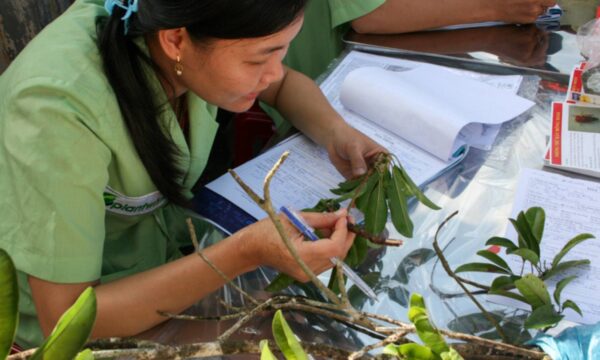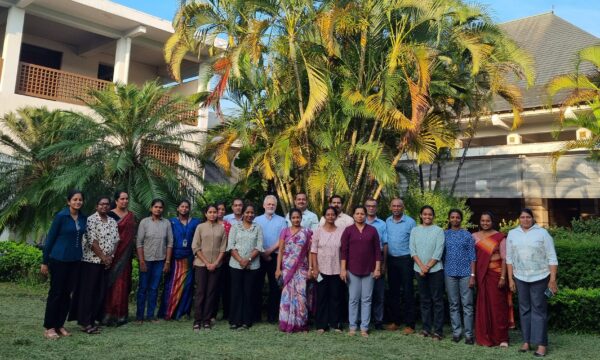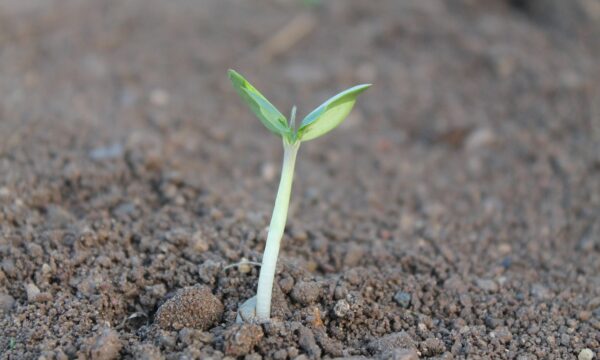Crop health in Bangladesh has never been more important. The FAO states that the agricultural sector employs almost 50% of Bangladesh’s population. And more than 70% of the country’s land is dedicated to growing crops.
Farmers grow a wide range of food crops, from rice and wheat to pulses and oil seeds. But climate change is badly affecting the country. Changing weather patterns and spreading crop diseases and pests threaten its crops. CGIAR makes an important observation. “Bangladesh is one of the most vulnerable countries in the world to climate change and variability.”
CABI has been active in Bangladesh for many years. With support from CABI, the Plant Protection Wing of the Department of Agricultural Extension (DAE) has been working with Plantwise for the past seven years.
But now, CABI’s PlantwisePlus team has expanded permanently into the country. Dr. Md. Saleh Ahmed was recently hired as an Associate in Bangladesh. His aim? To support the country’s plant health endeavours through PlantwisePlus.
A vision for crop health in Bangladesh
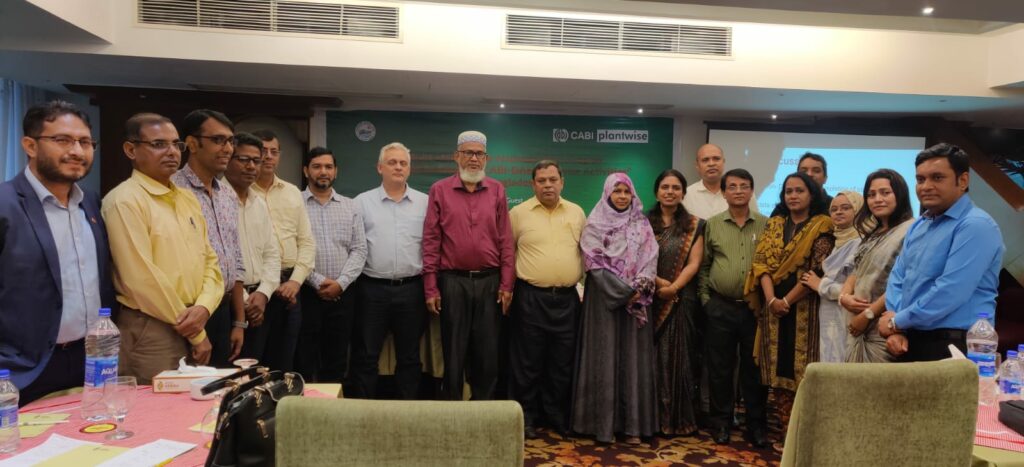
Attending a recent workshop, he said, “The PlantwisePlus digital tools have introduced frontline extension officers to digital learning. They are able to learn modules on field diagnosis at farm level, thereby minimizing crop losses.”
“Initiatives have already been undertaken to scale up the programme. This will be achieved by increasing the number of plant clinics throughout the country. PlantwisePlus will support Bangladesh to predict and prevent plant health threats. This will reduce crop losses, increase livelihoods and, ultimately, help towards greater food security.”
CABI and DAE held the workshop in the country’s capital, Dhaka. The event focused on scaling up PlantwisePlus activities. And it aimed to review the programme’s growth in Bangladesh.
During the event, attendees reviewed the progress made by 64 agricultural extension officers across the country. These experts support farmers on the ground with agricultural and plant health advice. The officers have become Master Trainers. They deliver CABI Academy training and knowledge on using CABI digital tools. These tools include the CABI BioProtection Portal and the PlantwisePlus Knowledge Bank. Worldwide, CABI digital tools bring science-based agricultural knowledge to millions of smallholder farmers.
To date, Plantwise has trained 5,800 sub-assistant agricultural officers (SAAOs), 900 of whom are women. CABI and the local authorities have established 150 plant clinics in Bangladesh. And they aim to create another 250 clinics by December 2022.
This means smallholder farmers will have an increasing amount of support for crop health in Bangladesh. The plant doctors who run the clinics advise farmers on all manner of crop health queries. This includes pests and diseases to soil health to climate-smart agricultural techniques. The advice they give helps farmers to safeguard their crops and their incomes.
During the event, the Master Trainers commented on how much they appreciated the guidance on using the CABI Academy. It helped them to make field diagnoses and plant health recommendations. Furthermore, PlantwisePlus plans to train 502 Agriculture Extension Officers (AEOs) across the country.
Attendees agreed that building strong partnerships between private and public stakeholders would help the PlantwisePlus programme. Many are interested to learn more about it. This includes national NGOs working in value chains and those working from post-harvest production to ICT.
The stakeholders acknowledged the efforts of CABI in Bangladesh. They pledged to enhance future collaboration and strengthen the implementation of PlantwisePlus in the country.
Attendees discussed future PlantwisePlus plans. In 2022, the programme will seek to scale up training through the rollout of CABI Academy across Bangladesh. This will help to train the SAAOs as plant doctors. CABI will continue to provide technical support and funding. The workshop also focused on PlantwisePlus’ holistic approach to plant health systems.
Initiatives are underway to strengthen future collaboration for PlantwisePlus through a signed MOU with public and private partners in Bangladesh. This will pave the way for long-term support under the PlantwisePlus programme.
This includes the use of CABI Horizon Scanning and Pest Risk Analysis tools. It also includes the control of the insects/pests by biological control agents. Collaborations and partnerships should support governments and farmers in a changing climate.
Recommendations for the future of crop health in Bangladesh
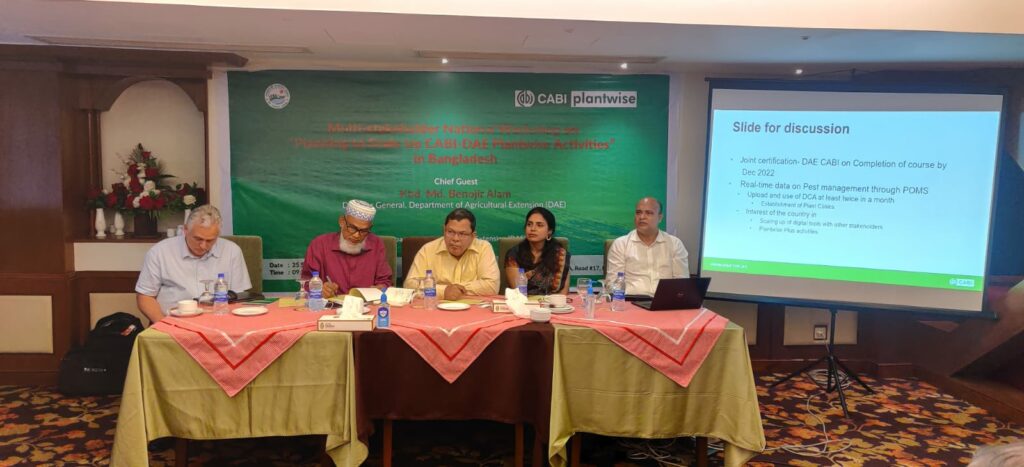
Attendees put forward lots of recommendations for the future of PlantwisePlus in Bangladesh. For example, build awareness among farmers about the hazards of excessive pesticide use. The programme should also increase farmers’ access to affordable lower-risk pesticide alternatives.
Attendees would like to see a programme developed to increase the use of biopesticides. This should include training in the use of biopesticides. And they would also like to see an increase in governmental, NGO and private sector collaborations.
People at the workshop suggested strengthening research into biocontrol. They would also like to establish a laboratory for biocontrol agent rearing. This would help to make natural pest control available at a community level through engaging local SMEs. Attendees would like to see increased monitoring of biopesticide products in Bangladesh. They also suggested developing a list of safe plant protection products. And they would like more awareness among the farmers and frontline extension officers (SAAOs) about these products.
Malvika Chaudhary is the Regional coordinator for Plantwise in Asia. She said that the workshop, “had a good consortium of participants from various sectors of the plant health system. This demonstrates that wide interest in Plantwise leverages its sustainability.”
“The PlantwisePlus digital tools have huge potential in Bangladesh. The national partners currently find the tools enhance the skills of extension workers. They look at technical backstopping from CABI to promote the use of biocontrol in their country very positively.”
For more information about PlantwisePlus, visit www.plantwiseplus.org
Photos courtesy of Dr. Md. Saleh Ahmed
PlantwisePlus is financially supported by the Directorate-General for International Cooperation (DGIS), Netherlands; European Commission Directorate General for International Partnerships (INTPA, EU); the Foreign, Commonwealth & Development Office (FCDO), United Kingdom; the Swiss Agency for Development and Cooperation (SDC); the Australian Centre for International Agricultural Research (ACIAR); the Ministry of Agriculture of the People’s Republic of China (MARA)
Related News & Blogs
How do pest risk registers address the spread of plant pests in Africa?
Pest risk registers can help to solve problems in agriculture, addressing the growing global threat of plant pests. Moreover, changing weather patterns, led by rising temperatures, are causing them to reproduce faster and expand into new regions. In ad…
10 July 2025

